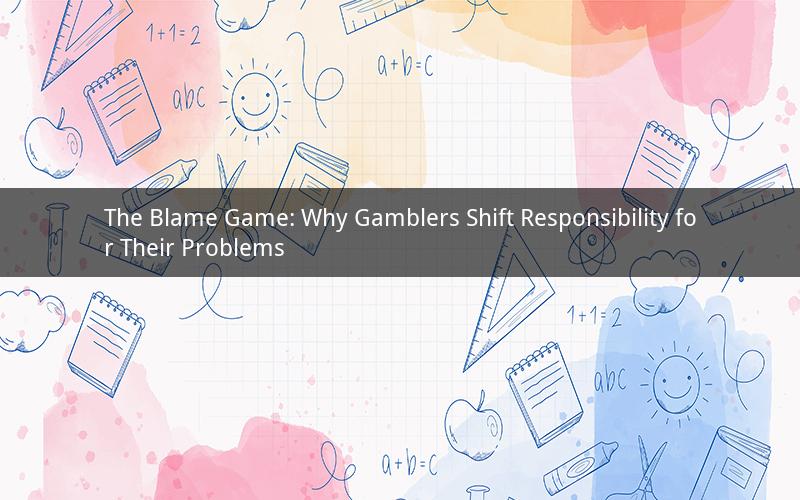
Introduction:
Gambling is an activity that can be both thrilling and dangerous. For some individuals, it becomes an addiction that ruins their lives. One common trait among gamblers is their tendency to shift responsibility for their problems onto others. This article delves into the reasons behind this behavior and explores the consequences it has on both the gambler and those around them.
1. The Psychology of Blame:
Gamblers often experience intense emotions during their gambling sessions, ranging from excitement to despair. When they face losses, they tend to feel a strong urge to justify their actions. Blaming others becomes a coping mechanism that helps them avoid taking responsibility for their decisions.
1.1 Rationalization:
Gamblers often rationalize their behavior by convincing themselves that they are just having a bad day or that they will win back their losses eventually. This rationalization allows them to avoid acknowledging the underlying problem of addiction.
1.2 Denial:
Denial is a powerful defense mechanism that gamblers use to protect themselves from the harsh reality of their addiction. By blaming others, they can maintain the illusion that their problems are not their own fault, thereby avoiding the need for change.
2. The Impact on Relationships:
Gamblers who blame everyone else for their problems often find themselves in strained relationships with family, friends, and colleagues. This behavior has several negative consequences:
2.1 Emotional Distance:
Blaming others creates a sense of disconnect between the gambler and their loved ones. The constant shifting of responsibility leads to emotional distance and a breakdown in communication.
2.2 Financial Strain:
Gambling addiction can cause significant financial problems. When gamblers blame others for their financial struggles, it becomes even more challenging for their families to support them or seek help.
2.3 Trust Issues:
Blaming others for their problems can erode trust within relationships. When a person consistently shifts responsibility, it becomes difficult for others to believe that they are genuinely committed to change.
3. The Consequences of Blame:
The blame game has several negative consequences for both the gambler and those around them:
3.1 Stagnation:
By avoiding responsibility, gamblers fail to address the root causes of their addiction. This leads to a lack of progress and perpetuates the cycle of addiction.
3.2 Increased Isolation:
Gamblers who blame others may find themselves becoming more isolated as their relationships deteriorate. This isolation can exacerbate the feelings of guilt, shame, and despair that fuel their addiction.
3.3 Legal and Financial Consequences:
Gamblers who shift responsibility for their problems may face legal and financial consequences due to their actions. This can include legal issues related to gambling debts or financial fraud.
4. Overcoming the Blame Game:
Breaking free from the blame game requires a conscious effort to take responsibility for one's actions. Here are some strategies that can help:
4.1 Acknowledge the Problem:
The first step in overcoming the blame game is to admit that there is a problem. This involves recognizing the signs of addiction and the impact it has on one's life.
4.2 Seek Support:
Seeking support from friends, family, or professionals is crucial in overcoming the blame game. Support systems can provide guidance, encouragement, and resources to help the gambler overcome their addiction.
4.3 Develop Coping Skills:
Gamblers often turn to gambling as a way to cope with negative emotions. Developing healthy coping skills, such as exercise, meditation, or hobbies, can help reduce the urge to gamble and shift responsibility onto others.
4.4 Engage in Therapy:
Therapy can be an effective tool in overcoming the blame game. A therapist can help the gambler understand the underlying causes of their addiction and develop strategies to address them.
5. Questions and Answers:
Q1: Can someone overcome a gambling addiction on their own?
A1: While it is possible for some individuals to overcome gambling addiction on their own, seeking support from friends, family, or professionals can significantly improve the chances of successful recovery.
Q2: How can family and friends help a gambler overcome their addiction?
A2: Family and friends can help by offering unconditional support, encouraging the gambler to seek help, and being aware of the signs of addiction. They should also take care of their own well-being to avoid becoming overwhelmed by the situation.
Q3: Are there any medications that can help treat gambling addiction?
A3: While there are no specific medications for gambling addiction, some medications may be prescribed to help manage the symptoms of co-occurring mental health disorders, such as depression or anxiety.
Q4: Can therapy alone help a gambler overcome their addiction?
A4: Therapy can be an effective component of treatment for gambling addiction. However, it is often most effective when combined with other strategies, such as support groups or financial counseling.
Q5: How long does it take to recover from a gambling addiction?
A5: The duration of recovery from a gambling addiction can vary widely among individuals. Some may experience immediate success, while others may require ongoing support and treatment for several years. The key is to remain committed to the recovery process and seek help when needed.